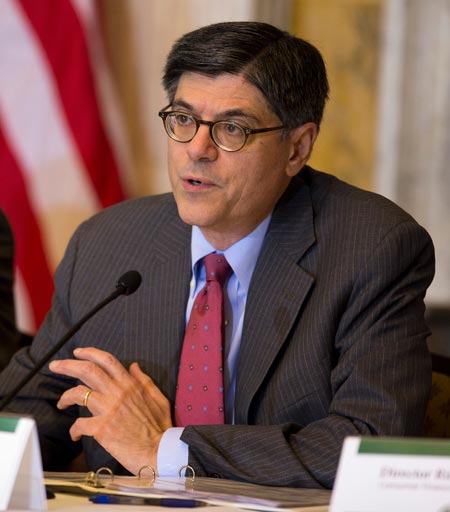 |
|
Jacob Lew: The United States Treasury Secretary is the first high-ranking US official to visit China after the Third Plenum of the Communist Party of China's 18th Central Committee ended on Tuesday with a communique underlining the market's decisive role. |
United States Treasury Secretary Jacob Lew arrives in China on Friday for a two-day visit on the last leg of a five-nation Asian tour.
While he is expected to hear about China's commitment to market opening when meeting Chinese leaders, China will require US commitment on issues such as the debt ceiling, observers say.
Lew is the first high-ranking US official to visit China after the Third Plenum of the Communist Party of China's 18th Central Committee ended on Tuesday with a communique underlining the market's decisive role.
It is also his second trip to the country after he met the new leadership in March.
He said earlier that there were many questions still to be answered concerning the communique, Bloomberg News reported.
As special representative of US President Barack Obama, Lew has already visited Japan, Singapore, Malaysia and Vietnam.
Tao Wenzhao, a senior research fellow on US studies at the Chinese Academy of Social Sciences, said Washington may be especially interested in parts of the communique concerning government financing and the banking system.
"Lew will not shy away from talking about China's deepening financial reform, and Washington will explore the possibility of expanding China's imports from the United States," Tao said.
Before Lew began his trip on Tuesday, officials in Washington told reporters that he would expand opportunities for US firms and US workers, The Wall Street Journal reported.
Lew said, "Building consumer demand in China, shifting the emphasis from some of the old State-owned enterprises to an economy that is more market-oriented — these are very important reforms."
Ruan Zongze, vice-president of the China Institute of International Studies, said two-way trade between the countries has exceeded $500 billion.
The Chinese government's effort in restructuring the domestic economy to ensure sustainability will "naturally meet the demand" for optimizing the Sino-US trade structure, Ruan said.
"The US cares about the direction of the reform and is trying to establish more ground rules for two-way interaction."
Shi Yinhong, a professor of Sino-US relations at Renmin University of China, said the two nations have made considerable progress in expanding their relationship in the past year.
"They held strategic and economic dialogues in July with fruitful results, and the two militaries have strengthened exchanges to dispel mistrust," Shi said.
Between Lew's two visits to China, the world witnessed a dramatic crisis on the US debt ceiling that partially shut down the government and has affected Washington's diplomatic agenda.
The crisis led to US Secretary of State John Kerry visiting Asia in place of Obama.
China is the largest holder of US treasury bonds, and Ruan said: "It seems uncertain whether the debt ceiling crisis will erupt again in February, when the next default deadline looms.
"Lew, as an authorized envoy, should also address Beijing's concerns on the debt ceiling issue and the demand to secure Chinese investment in US bonds."
Analysts said the trade imbalance between China and the US will also be on agenda.
Tao said one of the options for Washington to deal with an annual trade deficit of roughly $300 billion is to lift restrictions on high-tech exports to China.
Beijing told Washington last year that lifting the export limits would contribute at least $50 billion, but the US so far has not softened its attitude on this issue, Tao added.
Lew has tried to push for the conclusion of the US-led Trans-Pacific Partnership talks by the end of the year during his current visit.
In turn, China has called for promoting the Regional Comprehensive Economic Partnership, which includes the 10 members of the Association of Southeast Asian Nations.
"China will elaborate on the necessity of there being no negative competition between the two partnerships," Ruan said.
|
|
|
|
|
|
|
|
